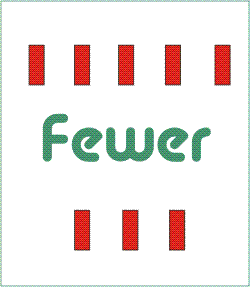 Do you have a hard time getting the usage of I and me right in your writings? I did too until I learned one simple trick that can be applied on the fly to get your prose in line proper grammar.
Do you have a hard time getting the usage of I and me right in your writings? I did too until I learned one simple trick that can be applied on the fly to get your prose in line proper grammar.
But first, I need to point out that this does not apply to dialog spoken by your characters. Not all your characters will (or should) speak with perfect grammar and sentence structure. Let their personality show through when they speak.
For non-fiction and expository text in fiction, getting I and me right will promote a professional appearance.
First, it is never proper to place the speaker’s pronoun first:
Me and Sally went to the movies and watched The Blob. Continue reading “I and Me, When to Use, How to See”
 One of my greatest pet peeves about modern writing is the flagrant misuse of the word “less”. I see it everywhere, even so called professional journalists are saying such things as “…we have 20 less laps to go in the race…” Advertisements claim, “Now with less calories” or “We have less waiting lines”. Less has become the defacto identifier for all quantity comparisons.
One of my greatest pet peeves about modern writing is the flagrant misuse of the word “less”. I see it everywhere, even so called professional journalists are saying such things as “…we have 20 less laps to go in the race…” Advertisements claim, “Now with less calories” or “We have less waiting lines”. Less has become the defacto identifier for all quantity comparisons.